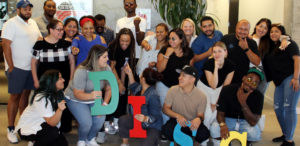People often use personality profiles to increase their emotional intelligence (EQ) and understand their own behavior. While the DISC personality profile can certainly be used in this way, we recommend that you use DISC as a tool to build your team.
At Team Verve, we use DISC as a tool, a language, and to be others-focused on a team. DISC is recognized as “the universal language of behavior.” It can be put to work in many different ways to improve communication, build trust, and boost team performance. What do we mean? Here are a few practical ideas:
Performance Management
As leaders and managers, part of our job is helping our teams grow and improve. One key aspect of this is giving regular, constructive, and encouraging feedback.
Use an employee’s DISC report to ask good questions about their needs and perspectives. A DISC report can jog your memory on areas where they are doing well or talk through an area they could improve. Throw away the stiff annual performance reviews and try regular meaningful feedback instead!
Hiring & Onboarding
It can be tempting to hire people who you connect well with and who have a similar personality as yourself. But we caution against this recruitment tactic. Instead, look for people that work well within your job requirements.
Many companies ask each serious job applicant to fill out a simple DISC assessment.. This equips you to ask good interview questions based on the applicant’s predictable strengths and weaknesses. “Do you see this as one of your strengths? How could this play out on the job?” “Do you think this is actually one of your weaknesses? How can our team help you in this area?”
The DISC Hiring Bundle goes a step further and quickly powers up a hiring campaign: It provides the DISC assessment along with a Job Match Tool and one-hour consultation to help you describe an ideal candidate for the position. By using DISC in the interview process, you have a common way to review hires with your management team that will improve clarity and speed.
Onboarding, when an individual joins your team, is a huge opportunity. Often team members are more receptive, trusting, and excited at the very beginning. Capitalize on this window of time by using personalized DISC onboarding training to position new team members to thrive on your team.

Sales & Customer Relations
Do you sell or work with a wide variety of customers? Learn to recognize the different personalities of your customers. Quickly speak into different customers’ concerns, values, and preferences.
Use the insights in the Direct Sales DISC report to expand your styles, tones, and preferences. Building strong business relationships demands that we learn to communicate effectively.
Meetings & Projects
Equipped with the knowledge that not everyone works in the same way, your team can make better use of each other’s strengths. For example, just because someone isn’t boldly asserting ideas, doesn’t mean they aren’t engaging.
Get a snapshot of your team using the DISC Team Chart. As you understand different styles on your team, you can embrace different work styles and put together a more rounded teams.
Conflict Resolution
Most people dislike conflict. Yet, conflict becomes a positive opportunity when a team appreciates differences. By understanding where someone is coming from, it is easier to embrace differences in communication style, speed of work, and perceived work ethic.
Many times, the success of a team is directly related to how well they can work through difficult things. Use DISC as a non-threatening framework to talk through each other’s differing perspectives, values, and blind spots. Use the DISC Interaction Guide to give any two members of a team tips and strategies for working together.

Build Vulnerability-Based Trust and Understanding
Teams must have high levels of trust to reach greatest productivity and effectiveness. If you have read the plethora of articles out there, you know that trust encourages questions, builds phycological safety, minimizes miscommunication, encourages quick decision making, enhances morale, and the list goes on. With such high-value benefits, the most asked question becomes, “How do I build trust?”
Vulnerability-based trust starts when team members begin to share openly with each other. Yet, getting our teams to start sharing can be easier said than done. DISC is just one simple tool you can use to jumpstart this kind of conversation.
DISC is only one tool and an imperfect one at that. Like many tools, it can be used in wrong ways. Never use DISC to make excuses about behavior, hammer someone over the head, or endlessly study yourself. Instead put DISC to work to give more specific feedback and ask better questions. Use it to understand the preferences and concerns of your customers, to build on the strengths of your employees and work through differences, to talk about hard things and build a culture of trust in your team. Use DISC as a tool to build your team. We are cheering you on!
If you have questions about any of these DISC tools, we are glad to point you in the right direction. Chat with Matt or checkout DISC training sessions, assessments, and team charts.
Team Verve, NYC



